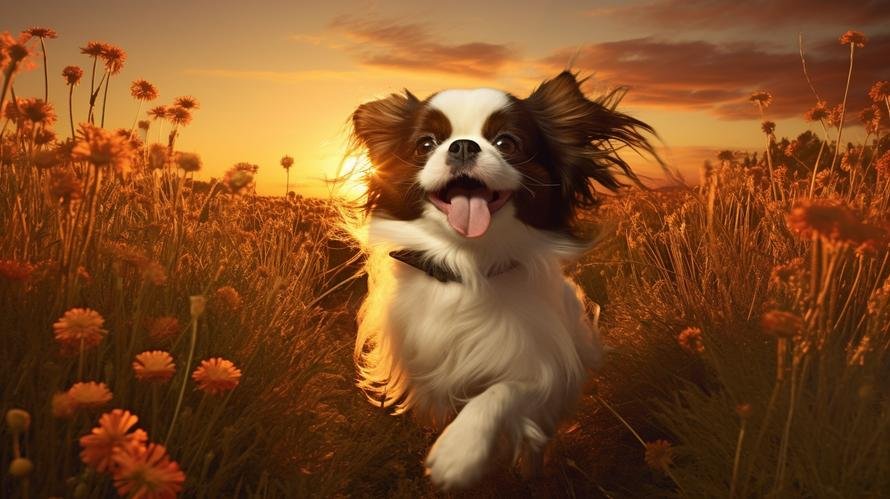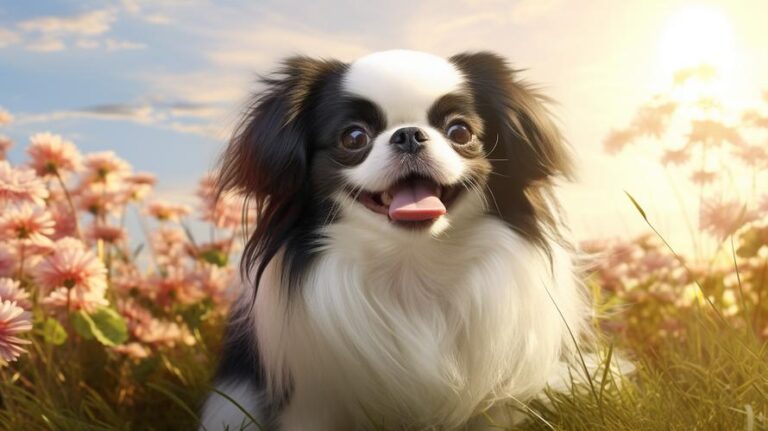Picture this: A charming dog with saucer-like eyes, diminutive size, and an air of regal nobility that somehow reminds you of an emperor. Now, the image that manifests in your mind, dear reader, may bring forth visions of a mythical creature from a fantasy novel. But this isn’t about a mythical beast. Instead, it’s about a dog breed that’s touted as a royal member of the canine kingdom – the Japanese Chin.
Did you know that the Japanese Chin was exclusively bred for Japanese nobility? Or that their unique ability to use their paws to wash their faces like cats might have inspired the character Mr. Jinks from the famous cartoon ‘Pixie and Dixie’? Interesting, isn’t it?
As captivating as they are, these small canines often raise one particular question among potential pet owners: Are Japanese Chins dangerous? A question poised frequently and one we’ll attempt to answer today, in hopes of dispelling any preconceptions you might hold.
But first, let’s walk the ancient corridors of time to understand where these royal canines come from.
The Japanese Chin, despite its name, has roots that wind back into the heart of ancient China. These dogs were bred for royalty and were often given as gifts to emissaries from Japan, hence earning their unique nomenclature. Their ripe history suggests they were used to keep royal lapids warm and entertained—an attribute that only the kind-hearted and the gentlest among beings can be entrusted with.
Now moving on to the burning question, how can such a petite, friendly, and affectionate creature be considered dangerous? Are those button-like eyes concealing a menacing glare? The answer, simply put, is no. The term ‘dangerous’ doesn’t align well with these adorable furballs. Japanese Chins are known for their gentle and loving demeanor.
Of course, a dog by nature has a instinctual link to their ancestors, the wolves. So, it is essential to understand that any dog, when threatened, fearful, or poorly trained, can show aggression. It isn’t exclusive to a Japanese Chin; it’s a general canine instinct.
Japanese Chins, however, are friendly, intelligent, and love forming close bonds with their human caretakers. They appreciate high perches, much like their feline friends, and adore toys—or anything they can turn into a toy. Their playful antics are a source of unlimited entertainment for their owners.
Like all dogs though, early socialization goes a long way in keeping them well-behaved and non-aggressive. It’s not just about keeping them receptive to humans but also promotes harmonious interactions with other pets. Japanese Chins are quick learners and can pick up on social cues and training faster than many other breeds.
To raise a well-mannered and safe Japanese Chin, here are some useful pieces of advice:
1. Begin Training Early: Just like any other dog breed, you’ll want to begin training your Japanese Chin from a young age. This should include obedience training, potty training, and socialization.
2. Socialize: Expose them to different environments, people, and other animals. This helps them become comfortable in various situations and reduces the likelihood of fear-based aggression.
3. Regular Exercise: Make sure your Japanese Chin gets plenty of exercises. They enjoy short walks and playtime. This helps keep them mentally stimulated and physically fit, reducing any unwanted behaviors.
4. Reward-Based Training: Japanese Chins respond well to positive reinforcement. This includes treats, praises, and petting. Reward-based training helps build a strong bond with your Chin and encourages good behavior.
So, in conclusion, the image of a Japanese Chin being a dangerous creature is a far cry from the realities of this affectionate, intelligent, and playful canine nobility. With consistent training, love, and socialization, a Japanese Chin can prove to be an enchanting addition to your family. Instead of being a source of danger, they can be a reservoir of royal love and unending leisure.
Remember, no breed is inherently dangerous. It all boils down to how we, as pet owners, choose to raise, train, and treat them with the love, respect, and kindness they so richly deserve.



